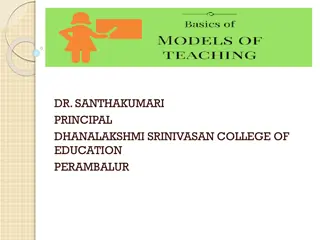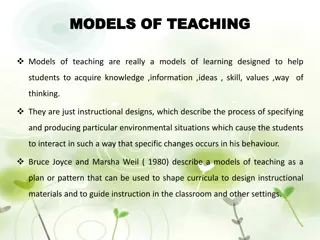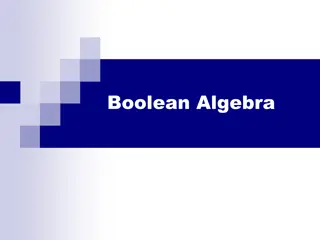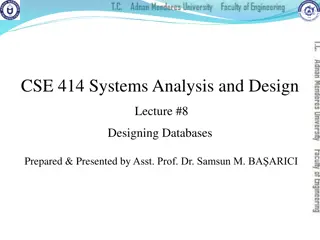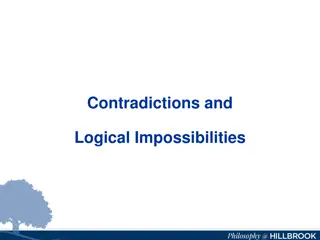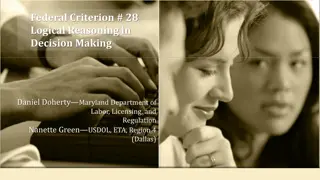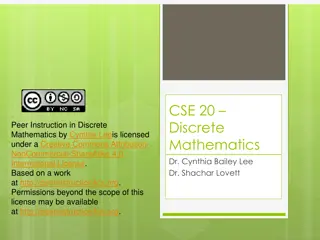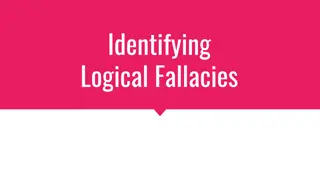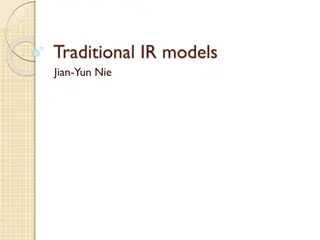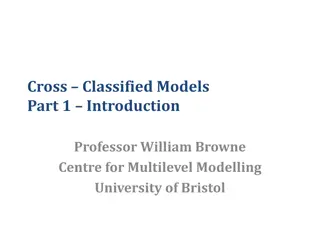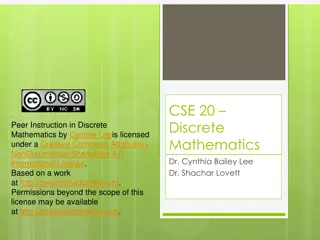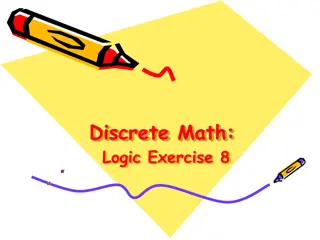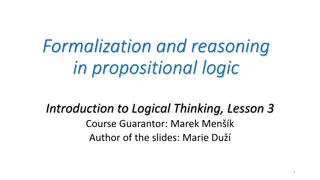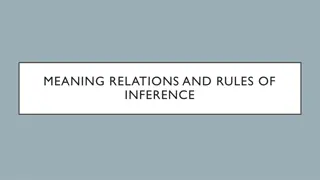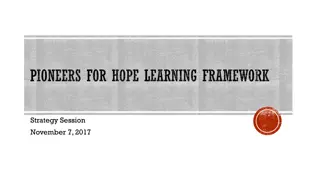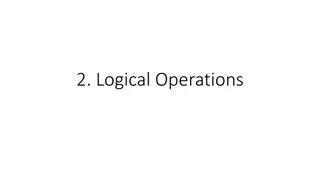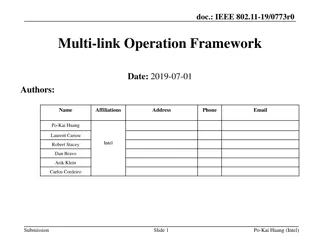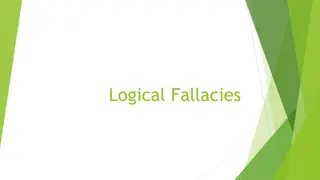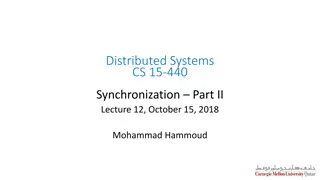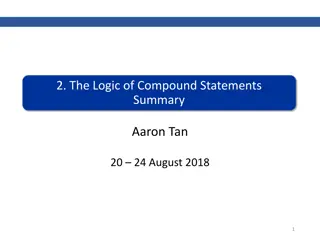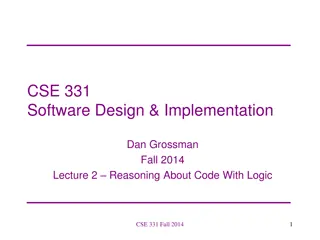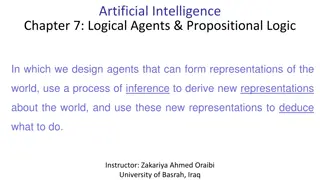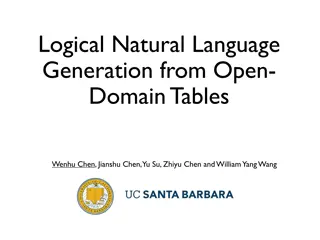Global Climate Models
Scientists simulate the climate system and project future scenarios by observing, measuring, and applying knowledge to computer models. These models represent Earth's surface and atmosphere using mathematical equations, which are converted to computer code. Supercomputers solve these equations to pr
3 views • 15 slides
Understanding Logical Form and Equivalence in Conditional Statements
Delve into the intricacies of logical form, equivalence, and compound statements in the realm of propositional logic. Explore valid and invalid arguments, conditional statements, and the logic of compound statements with puzzles to sharpen your logical reasoning skills. Unravel scenarios like determ
2 views • 81 slides
System Models in Software Engineering: A Comprehensive Overview
System models play a crucial role in software engineering, aiding in understanding system functionality and communicating with customers. They include context models, behavioural models, data models, object models, and more, each offering unique perspectives on the system. Different types of system
3 views • 33 slides
Understanding Input-Output Models in Economics
Input-Output models, pioneered by Wassily Leontief, depict inter-industry relationships within an economy. These models analyze the dependencies between different sectors and have been utilized for studying agricultural production distribution, economic development planning, and impact analysis of i
8 views • 7 slides
Understanding Models of Teaching in Education
Exploring different models of teaching, such as Carroll's model, Proctor's model, and others, that guide educational activities and environments. These models specify learning outcomes, environmental conditions, performance criteria, and more to shape effective teaching practices. Functions of teach
2 views • 20 slides
Understanding Models of Teaching for Effective Learning
Models of teaching serve as instructional designs to facilitate students in acquiring knowledge, skills, and values by creating specific learning environments. Bruce Joyce and Marsha Weil classified teaching models into four families: Information Processing Models, Personal Models, Social Interactio
1 views • 28 slides
Logical Expressions and Symbolism in Sentential Logic
Understanding sentential logic, logical expressions, and symbols through examples of logical reasoning and inference. Explore the concepts of logical OR, AND, negation, and the complexities of inclusive and exclusive logic in various scenarios.
1 views • 33 slides
Understanding Boolean Algebra and Logical Statements
Introduction to Boolean algebra, logical statements, and compound statements. Explore the concepts of Boolean variables, logical operators, writing conventions, equivalence in Boolean algebra, and truth tables. Learn how to analyze and evaluate logical expressions using truth tables.
1 views • 25 slides
Database Design Process and Concepts
This lecture on designing databases covers the database design process, normalization, transforming E-R diagrams, physical database design concepts, and steps in logical database modeling. It highlights the importance of logical and physical database design in system development, providing insights
0 views • 64 slides
Significance of Models in Agricultural Geography
Models play a crucial role in various disciplines, including agricultural geography, by offering a simplified and hypothetical representation of complex phenomena. When used correctly, models help in understanding reality and empirical investigations, but misuse can lead to dangerous outcomes. Longm
0 views • 8 slides
Exploring Contradictions and Logical Impossibilities
Explore a series of paradoxes and logical puzzles, ranging from being in two places at once to time travel conundrums. Discover the concept of contradictions and logical impossibilities through thought-provoking scenarios and riddles. Dive into the realm of impossibilities and challenge your underst
1 views • 6 slides
Enhancing Information Retrieval with Augmented Generation Models
Augmented generation models, such as REALM and RAG, integrate retrieval and generation tasks to improve information retrieval processes. These models leverage background knowledge and language models to enhance recall and candidate generation. REALM focuses on concatenation and retrieval operations,
1 views • 9 slides
Enhancing Logical Reasoning in Decision Making Process
Federal Criterion #28 emphasizes the importance of stating logical reasons for decisions that align with findings of fact and conclusions of law. This criterion is key to ensuring fairness and accuracy in legal analysis. The scoring criteria, national appeals review results, and ways to improve scor
1 views • 8 slides
Understanding Boolean Algebra and Logical Statements
Boolean Algebra allows for formalizing logical reasoning using variables that can be either true or false. It involves logical statements, compound expressions, logical operators like AND, OR, NOT, writing conventions, equivalence, and truth tables to determine the truth values of statements. By und
0 views • 25 slides
Understanding Logical Connectives in Discrete Mathematics
Explore the world of propositional logic and truth tables in discrete mathematics through a peer-instruction approach. Learn about basic logical connectives, new connectives, complex formulas, operator precedence, and the nuances of implication (implies) with engaging examples. Delve into scenarios
0 views • 14 slides
Understanding Propositional Logic and Logical Operators
Learn about propositional logic, statements, logic operators, compound statements, exclusive-or, logical equivalence, and writing logical formulas for truth tables. Explore how to create compound statements for exclusive-or using different approaches and ensure logical equivalence. Enhance your know
0 views • 26 slides
Understanding Logical Relations in Programming Languages
Explore the concept of logical relations in programming languages, focusing on the relation between high-level and low-level programs. Learn about contextual equivalence, its benefits and limitations, and how logical relations offer a robust framework for defining program equivalence. Discover why l
0 views • 18 slides
Understanding Laws of Logic and Logical Reasoning
Laws of logic play a crucial role in reasoning and making deductions. This comprehensive guide explains the use of contrapositives, examples of conditional statements, and the significance of laws like the Law of Syllogism. Understanding these principles helps in effectively analyzing statements and
0 views • 8 slides
Introduction to Symbolic Logic: Understanding Logical Inferences
Logic is the study of reasoning methods to distinguish between correct and incorrect arguments. Symbolic Logic involves representing logic symbolically for easier understanding and manipulation. Logical inferences help in making decisions based on reasoning chains. The content discusses the use of l
1 views • 28 slides
Identifying Logical Fallacies in Sources: Presentation Assignment
Learn to identify logical fallacies in various sources by analyzing passages and applying the Logical Fallacy Referee tool. Work in pairs to select sources, identify fallacies, and present annotated examples to the class.
0 views • 7 slides
Understanding Information Retrieval Models and Processes
Delve into the world of information retrieval models with a focus on traditional approaches, main processes like indexing and retrieval, cases of one-term and multi-term queries, and the evolution of IR models from boolean to probabilistic and vector space models. Explore the concept of IR models, r
0 views • 65 slides
Understanding Cross-Classified Models in Multilevel Modelling
Cross-classified models in multilevel modelling involve non-hierarchical data structures where entities are classified within multiple categories. These models extend traditional nested multilevel models by accounting for complex relationships among data levels. Professor William Browne from the Uni
0 views • 13 slides
Peer Instruction in Discrete Mathematics
Explore the world of discrete mathematics with Dr. Cynthia Bailey Lee and Dr. Shachar Lovett through peer instruction. Dive into topics like step-by-step equivalence proofs and the equivalence of logical operators. Discover the different methods to show propositions are equivalent and delve into log
0 views • 14 slides
Propositions and Logical Connectives Exercise Solutions
In this exercise, propositions involving grizzly bears, hiking safety, and ripe berries are formulated using logical connectives. Solutions are provided for various scenarios including conjunctions, conditionals, biconditionals, and more. The explanations offer a structured approach to understanding
0 views • 6 slides
Understanding Economic Models: Assumptions, Deductive Reasoning, and Logical Fallacies
Economic models utilize deductive reasoning to simplify real-world economic relationships. Assumptions vs. implications are key components, where assumptions reflect reality or are simplifying. This process helps identify conditions for specific outcomes to occur and distinguishes between consequent
1 views • 17 slides
Introduction to Propositional Logic: Formalization and Reasoning
Understanding formalization in propositional logic involves replacing atomic propositions with propositional variables and natural language connectives with logical connectives. The process abstracts from internal proposition structure, reducing meaning to True or False. The language allows formaliz
0 views • 18 slides
The Logical Structure of Classical and Quantum Mechanics
The paper explores the common logical structure shared between classical and quantum mechanics, emphasizing the non-distributive lattice embedded in a distributive one. It discusses how all physical theories must adhere to this structure, incorporating topology, Heyting algebra, Boolean algebra, and
1 views • 36 slides
Introduction to Logical Thinking in Computer Science at VSB - Technical University of Ostrava
This course introduces the concept of logical thinking in Computer Science at VSB - Technical University of Ostrava. Topics include valid arguments, deductive reasoning, and the science of correct reasoning. Requirements for passing the course include written tests and exams with specified grade ran
0 views • 18 slides
Understanding Meaning, Relations, and Rules of Inference in Logic
Exploring the concept of meaning, relations, and rules of inference in logic through the use of truth tables to evaluate logical formulas. Discover how tautologies and contradictions are identified, and how logical operators influence the truth values of propositions. Delve into examples that showca
0 views • 24 slides
Pathways to Student Success Strategy Session Summary
The Pioneers for Hope Learning Framework Strategy Session held on November 7, 2017, focused on creating models to illustrate pathways to student success. Participants formed groups to design models depicting elements that contribute to or hinder student success, with a special emphasis on food insec
0 views • 8 slides
Understanding Composite Models in Building Complex Systems
Composite models are essential in representing complex entities by combining different types of models, such as resource allocation, transport, and assembly models. Gluing these models together allows for a comprehensive representation of systems like the milk industry, where raw materials are trans
0 views • 27 slides
Understanding Logical Operations and Their Applications
Logical operators such as AND, OR, NOT, and XOR play a crucial role in programming and control systems. They are used to combine logical expressions and make decisions based on certain conditions. By utilizing truth tables, these operators help in solving problems efficiently. This article explores
0 views • 24 slides
IEEE 802.11-19/0773r0 Multi-link Operation Framework Summary
The document discusses the multi-link operation framework for IEEE 802.11-19/0773r0, focusing on load balancing and aggregation use cases. It introduces terminology related to multi-link logical entities and provides examples of multi-link AP and non-AP logical entities. The framework considers stee
0 views • 16 slides
Understanding Logical Fallacies: Common Types and Examples
Logical fallacies are errors in reasoning that can undermine the validity of arguments. This content covers various types of fallacies such as circular logic, either/or fallacy, oversimplification, overgeneralization, stereotyping, and ad hominem attacks. Examples and explanations are provided for e
0 views • 16 slides
Understanding Distributed System Synchronization and Logical Clocks
Continuing from the previous lecture on time synchronization, this session delved into logical clock synchronization, mutual exclusion, and election algorithms in distributed systems. Logical clocks, such as Lamport's Clock and Vector Clock, play a crucial role in defining the order of events withou
0 views • 33 slides
Understanding Compound Statements in Logic
The summary discusses the logic of compound statements, covering logical form, equivalence, tautologies, contradictions, conditional statements, valid and invalid arguments, and more. It explains the definitions of statements, negation, conjunction, disjunction, statement form, logical equivalence,
0 views • 12 slides
Logical Reasoning in Software Design and Implementation
Logical reasoning in software development involves determining the truth of facts as a program runs under specific assumptions. This process complements testing by allowing programmers to reason about classes of inputs/states and verify program correctness. Hoare Logic is introduced as a method for
0 views • 35 slides
Understanding Logical Agents and Propositional Logic in AI
Designing logical agents involves forming representations of the world, using inference for deriving new insights, and deducing actions based on these representations. Knowledge Base (KB) is a crucial component, comprising known facts and current percepts to infer hidden states. Propositional logic,
0 views • 23 slides
Introduction to Logical Thinking: Science of Correct Reasoning
Logic, the science of correct reasoning, explores ways to infer conclusions from assumptions and validate arguments. This course introduces logic as a tool for analyzing arguments, automating processes, and enhancing communication clarity. Through classic logic variants like propositional and predic
0 views • 30 slides
Advancements in Logical Natural Language Generation from Open-Domain Tables
Cutting-edge research in logical natural language generation (NLG) is transforming the field by moving beyond traditional surface realization to generate summarized text, conclude trends, and apply logical and mathematical operations. By addressing limitations such as lack of logical inference, summ
0 views • 33 slides




